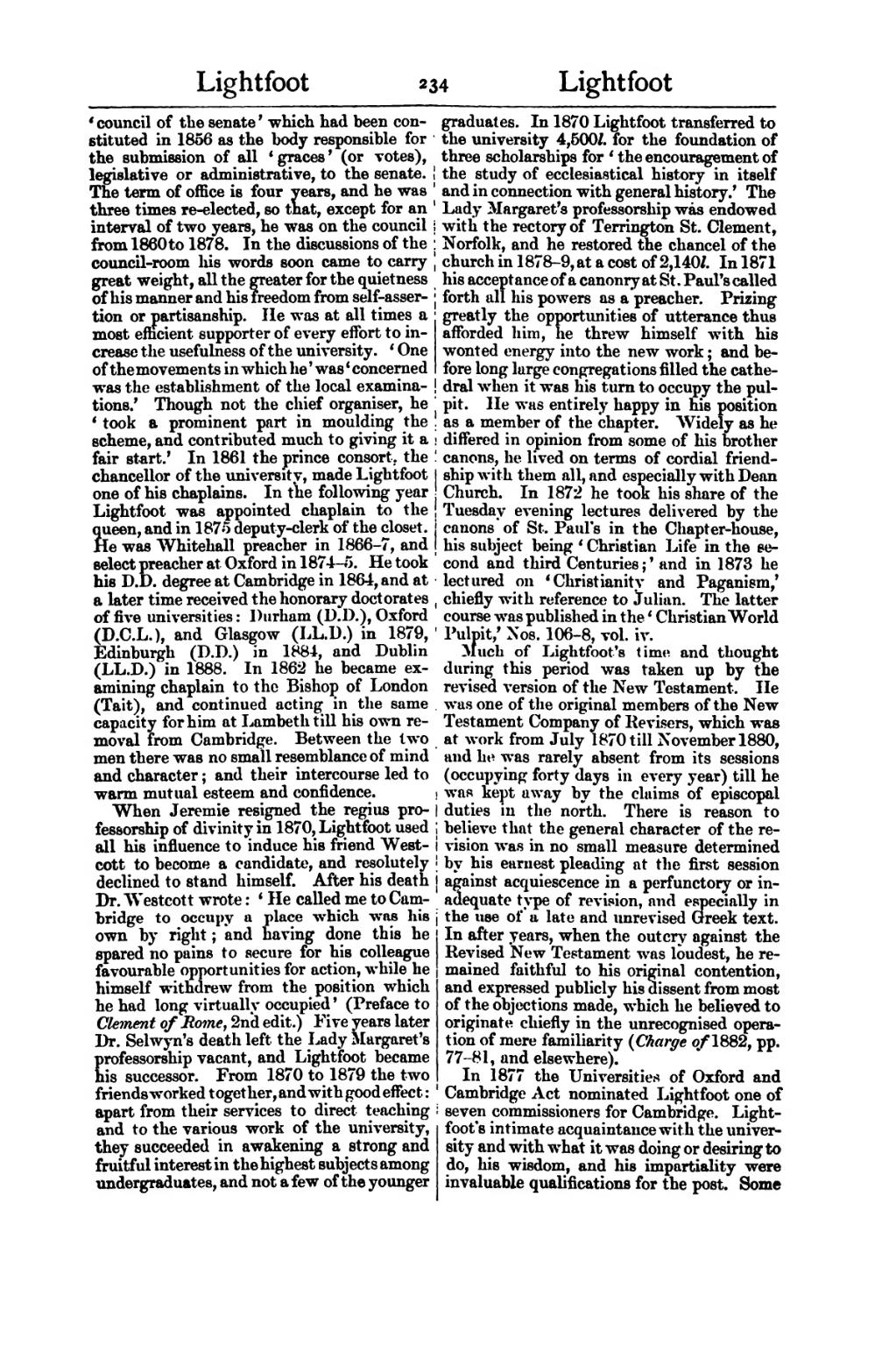‘council of the senate’ which had been constituted in 1856 as the body responsible for the submission of all ‘graces’ (or votes), legislative or administrative, to the senate. The term of office is four years, and he was three times re-elected, so that, except for an interval of two years, he was on the council from 1860 to 1878. In the discussions of the council-room his words soon came to carry great weight, all the greater for the quietness of his manner and his freedom from self-assertion or partisanship. He was at all times a most efficient supporter of every effort to increase the usefulness of the university. ‘One of the movements in which he’ was ‘concerned was the establishment of the local examinations.’ Though not the chief organiser, he ‘took a prominent part in moulding the scheme, and contributed much to giving it a fair start.’ In 1861 the prince consort, the chancellor of the university, made Lightfoot one of his chaplains. In the following year Lightfoot was appointed chaplain to the queen, and in 1875 deputy-clerk of the closet. He was Whitehall preacher in 1866–7, and select preacher at Oxford in 1874–5. He took his D.D. degree at Cambridge in 1864, and at a later time received the honorary doctorates of five universities: Durham (D.D.), Oxford (D.C.L.), and Glasgow (LL.D.) in 1879, Edinburgh (D.D.) in 1884, and Dublin (LL.D.) in 1888. In 1862 he became examining chaplain to the Bishop of London (Tait), and continued acting in the same capacity for him at Lambeth till his own removal from Cambridge. Between the two men there was no small resemblance of mind and character; and their intercourse led to warm mutual esteem and confidence.
When Jeremie resigned the regius professorship of divinity in 1870, Lightfoot used all his influence to induce his friend Westcott to become a candidate, and resolutely declined to stand himself. After his death Dr. Westcott wrote: ‘He called me to Cambridge to occupy a place which was his own by right; and having done this he spared no pains to secure for his colleague favourable opportunities for action, while he himself withdrew from the position which he had long virtually occupied’ (Preface to Clement of Rome, 2nd edit.) Five years later Dr. Selwyn's death left the Lady Margaret's professorship vacant, and Lightfoot became his successor. From 1870 to 1879 the two friends worked together, and with good effect: apart from their services to direct teaching and to the various work of the university, they succeeded in awakening a strong and fruitful interest in the highest subjects among undergraduates, and not a few of the younger graduates. In 1870 Lightfoot transferred to the university 4,500l. for the foundation of three scholarships for ‘the encouragement of the study of ecclesiastical history in itself and in connection with general history.’ The Lady Margaret's professorship was endowed with the rectory of Terrington St. Clement, Norfolk, and he restored the chancel of the church in 1878–9, at a cost of 2,140l. In 1871 his acceptance of a canonry at St. Paul's called forth all his powers as a preacher. Prizing greatly the opportunities of utterance thus afforded him, he threw himself with his wonted energy into the new work; and before long large congregations filled the cathedral when it was his turn to occupy the pulpit. He was entirely happy in his position as a member of the chapter. Widely as he differed in opinion from some of his brother canons, he lived on terms of cordial friendship with them all, and especially with Dean Church. In 1872 he took his share of the Tuesday evening lectures delivered by the canons of St. Paul's in the Chapter-house, his subject being ‘Christian Life in the second and third Centuries;’ and in 1873 he lectured on ‘Christianity and Paganism,’ chiefly with reference to Julian. The latter course was published in the ‘Christian World Pulpit,’ Nos. 106–8, vol. iv.
Much of Lightfoot's time and thought during this period was taken up by the revised version of the New Testament. He was one of the original members of the New Testament Company of Revisers, which was at work from July 1870 till November 1880, and he was rarely absent from its sessions (occupying forty days in every year) till he was kept away by the claims of episcopal duties in the north. There is reason to believe that the general character of the revision was in no small measure determined by his earnest pleading at the first session against acquiescence in a perfunctory or inadequate type of revision, and especially in the use of a late and unrevised Greek text. In after years, when the outcry against the Revised New Testament was loudest, he remained faithful to his original contention, and expressed publicly his dissent from most of the objections made, which he believed to originate chiefly in the unrecognised operation of mere familiarity (Charge of 1882, pp. 77–81, and elsewhere).
In 1877 the Universities of Oxford and Cambridge Act nominated Lightfoot one of seven commissioners for Cambridge. Lightfoot's intimate acquaintance with the university and with what it was doing or desiring to do, his wisdom, and his impartiality were invaluable qualifications for the post. Some

